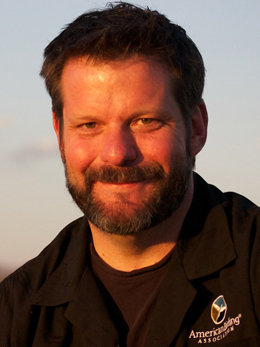“The birds are always out there waiting for us to notice them,” said Jeffrey Gordon, this year’s keynote speaker at the 21st annual Kachemak Bay Shorebird Festival.
Gordon, 48, is the president of the American Birding Association based in Colorado Springs, Colo. He will be welcomed to Homer at a reception with featured author Philip Hoose from 6 to 8 p.m. Friday at Land’s End Resort. At 7 p.m. Saturday at the Mariner Theatre, Gordon presents his keynote talk, “Birding Together.”
An author, photographer and birding guide, Gordon worked as a naturalist interpreter at Yosemite National Park, Acadia National Park and Santa Ana National Wildlife Refuge. In his 20s and after graduating with a bachelor of arts in biology and parks and recreation for the University of Delaware, he was a bird tour leader with Victor Emanuel Nature Tours, a job that took him to birding hotspots throughout North America, including the Aleutian Islands and the Pribilof Islands in Alaska, Hudson Bay and Baffin Island.
“It was an utterly fantastic job,” he said. “It was getting to travel and work with all sorts of people. It was a dream job.”
Like many children, Gordon bounced around in his interests, from sharks to snakes.
As a boy growing up in Wilmington, Del., he didn’t really care for birds much, but a trip to the Everglades in Florida at age 12 changed that.
“That really opened my eyes that there were all these big wading birds and water birds you could study more,” he said. “I went home and started looking at the birds in Wilmington and in my hard with a whole new set of eyes.”
That shift in perspective is something as head of the ABA that he’d like to see in birding as a hobby and community. He said it’s an amazing time for birding and birding festivals.
“People are realizing native birds and habitat are something to celebrate and something that’s valuable,” he said. “(The ABA) is extremely influential in opening people’s eyes for the potential of having these kind of things.”
Gordon has seen festivals like the Kachemak Bay Shorebird Festival grow in the past few decades.
“There’s certainly been an explosion,” he said.
Gordon spends a lot of time attending and speaking at festivals. Some festivals are one-day events at wildlife refuges or parks, such as for Migratory Bird Day. Others are like the Space Coast, Rio Grand Valley and Kachemak Bay Shorebird Festival.
“Those latter are multi-day events trying to bring in people for multiple nights, trying to bump up ‘the heads and beds,’ like the convention and visitor bureau people like to say,” he said.
Gordon also would like to see birding become more diverse and break out of the stereotype of birders as wealthy, older people.
“The thing that is really changing is a lot of us realize you can’t just keep having the same bird club meetings and the bird club field trips in the same way and expect it to diversify,” he said. “A lot of innovation is reaching out to people where they are. One of those keys is the internet.”
As an example, Gordon mentioned a birding festival in Boulder, Colo., Gullapalooza, that celebrates gulls and waterfowl at a reservoir that doesn’t freeze because of a nearby power plant putting hot water into it. At first the festival started at 8 a.m. A few years ago Gullapalooza got the idea to start at noon.
“That trip now gets well over 300 people each year,” he said. “We get used to things the way they are.”
For families with kids, they want inexpensive, wholesome activities. They don’t want to get up early and try to get the kids dressed. That’s the sort of change that could broaden birding, he said.
“There’s a lot of relatively low-hanging fruit that’s out there,” Gordon said. “If we focus our efforts on where the people area, and not focusing on finding the most rare and beautiful bird.”
That’s the magic of birding, he said.
“One of the things that’s amazing for birds is they’re available to everybody just about all the time,” he said. “People are always hungry to connect to nature and natural prophecies. Not everything lives and dies on the contents of your email box.”
Birding can be like running or sports, he said. You don’t need to run a marathon to enjoy running. You don’t need to climb Everest to enjoy mountains.
“Wherever you are, birds are there to meet you,” he said. “You can practice it at all different levels.”
Gordon said he and his wife Liz hope to meet a few new birds themselves — eight new ones for Liz. Her life list is at 592 species seen. It will be Liz’s first time in Alaska and she might see some lifers, as birders call new birds seen.
“I’m super looking forward to her seeing those things for the first time,” he said, including a possible 600th bird. “I’m looking forward to what that is.”
Michael Armstrong can be reached at michael.armstrong@homernews.com.


